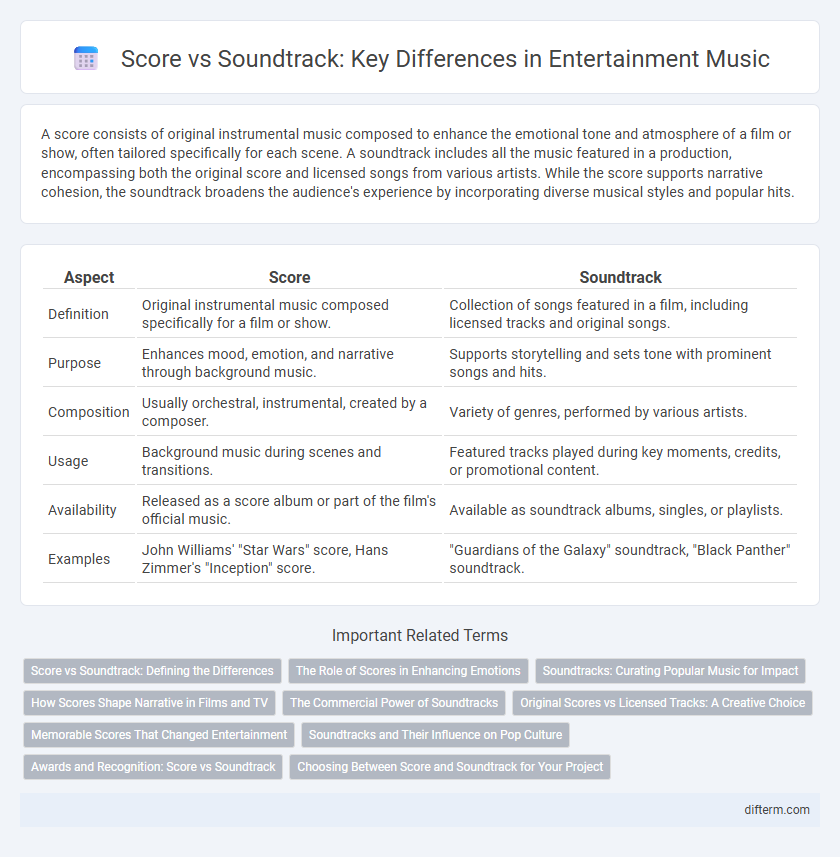A score consists of original instrumental music composed to enhance the emotional tone and atmosphere of a film or show, often tailored specifically for each scene. A soundtrack includes all the music featured in a production, encompassing both the original score and licensed songs from various artists. While the score supports narrative cohesion, the soundtrack broadens the audience's experience by incorporating diverse musical styles and popular hits.
Table of Comparison
| Aspect | Score | Soundtrack |
|---|---|---|
| Definition | Original instrumental music composed specifically for a film or show. | Collection of songs featured in a film, including licensed tracks and original songs. |
| Purpose | Enhances mood, emotion, and narrative through background music. | Supports storytelling and sets tone with prominent songs and hits. |
| Composition | Usually orchestral, instrumental, created by a composer. | Variety of genres, performed by various artists. |
| Usage | Background music during scenes and transitions. | Featured tracks played during key moments, credits, or promotional content. |
| Availability | Released as a score album or part of the film's official music. | Available as soundtrack albums, singles, or playlists. |
| Examples | John Williams' "Star Wars" score, Hans Zimmer's "Inception" score. | "Guardians of the Galaxy" soundtrack, "Black Panther" soundtrack. |
Score vs Soundtrack: Defining the Differences
A score consists of original instrumental music composed specifically for a film, enhancing mood and narrative, while a soundtrack includes all audio elements such as songs, dialogue, and ambient sounds within the movie. Scores are often orchestral and are crafted to subtly support cinematic storytelling, whereas soundtracks may feature curated songs from various artists to evoke a particular era or emotion. Understanding the distinction between score and soundtrack helps in appreciating how music shapes the overall entertainment experience in film.
The Role of Scores in Enhancing Emotions
Scores play a crucial role in enhancing emotions by using instrumental music specifically composed to mirror on-screen moods and intensify viewers' emotional experiences. Unlike soundtracks, which often feature pre-existing songs, scores are tailored to the narrative's pacing and emotional beats, subtly guiding audience reactions through motifs and orchestration. This dynamic interplay between visual storytelling and musical themes elevates dramatic tension and deepens character development in films and television.
Soundtracks: Curating Popular Music for Impact
Soundtracks curate popular music to enhance emotional resonance and cultural relevance in films, creating memorable auditory experiences that extend beyond the narrative. By selecting contemporary hits or iconic tracks, soundtracks connect audiences to familiar tunes, amplifying storytelling impact and marketability. This strategic use of popular music often drives soundtrack albums to become standalone commercial successes.
How Scores Shape Narrative in Films and TV
Film and TV scores intricately shape narrative by enhancing emotional depth and guiding audience response through carefully composed instrumental music. Unlike soundtracks that compile existing songs, scores are bespoke compositions that underscore character development and thematic motifs, creating an immersive storytelling experience. Composers like Hans Zimmer and John Williams exemplify how expertly crafted scores elevate plot tension, mood, and pacing, solidifying the score's role as a pivotal narrative device.
The Commercial Power of Soundtracks
Soundtracks drive significant commercial success by blending popular songs with cinematic storytelling, creating memorable emotional connections that boost album sales, streaming numbers, and concert revenues. Scores, while essential for mood and atmosphere, rarely generate the same level of mainstream engagement or cross-media marketing opportunities as soundtracks do. The strategic use of licensed tracks in soundtracks often leads to soundtrack albums charting independently, becoming revenue powerhouses for both film studios and music labels.
Original Scores vs Licensed Tracks: A Creative Choice
Original scores provide composers the opportunity to craft unique music that enhances a film's emotional depth and narrative flow, tailored specifically to scene dynamics. Licensed tracks bring recognizable songs that evoke cultural resonance and audience familiarity, often anchoring moments in a broader musical context. Filmmakers weigh the creative control and thematic cohesion of original scores against the evocative power and commercial appeal of licensed music when shaping a project's auditory identity.
Memorable Scores That Changed Entertainment
Memorable scores like John Williams' compositions for "Star Wars" and Hans Zimmer's work on "Inception" transformed entertainment by enhancing emotional depth and narrative immersion. Unlike soundtracks, which compile various songs, scores are original orchestral pieces tailored specifically to underscore scenes, elevating storytelling. These iconic scores have become integral to film legacy, influencing how audiences connect with cinematic experiences.
Soundtracks and Their Influence on Pop Culture
Soundtracks play a pivotal role in shaping pop culture by blending popular music with cinematic storytelling, creating iconic moments that resonate beyond the screen. Chart-topping songs featured in movies often spark trends, influence fashion, and boost the careers of recording artists, while movie soundtracks become standalone cultural phenomena. This synergy between film and music fosters a deeper emotional connection with audiences, ensuring lasting impact on entertainment and popular culture.
Awards and Recognition: Score vs Soundtrack
Scores and soundtracks often compete for prestigious awards, with scores primarily recognized at ceremonies like the Academy Awards for Best Original Score, highlighting instrumental compositions that enhance a film's emotional depth. Soundtracks, featuring curated collections of songs, frequently gain acclaim in categories such as the Grammy Award for Best Compilation Soundtrack or Best Soundtrack Album, reflecting their cultural impact and popularity. Both score and soundtrack contribute uniquely to a film's identity, with award distinctions emphasizing their different artistic and commercial roles in entertainment.
Choosing Between Score and Soundtrack for Your Project
Choosing between a score and a soundtrack depends on the emotional tone and narrative depth of your project. A score, composed specifically for scenes, enhances mood and character development through instrumental themes, while a soundtrack features pre-existing songs that add cultural context or evoke particular eras. Prioritizing a score benefits immersive storytelling, whereas a soundtrack leverages audience recognition and emotional resonance from familiar tracks.
score vs soundtrack Infographic

 difterm.com
difterm.com